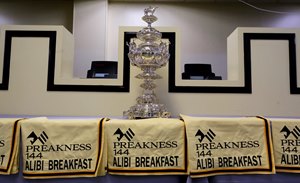Preakness Stalwarts Savor Alibi Breakfast


With the future of Pimlico Race Course and the Preakness Stakes (G1) in Baltimore in doubt beyond next year, the racing community gathered in the clubhouse dining room May 16 to renew ties, tell tales, and share in the tradition of the old track's Alibi Breakfast.
As stated yearly in the event's program, "It started with a cup of coffee. In the late 1930s on the porch of the historic Pimlico Clubhouse, a group of trainers, owners, and greater and lesser dignitaries would gather in the mornings to expound upon the merits of their horses."
From that cup of coffee and banter between trainers Yancey Christmas, Horatio Luro, and others came an Alibi Breakfast that features a variety of awards, speeches by trainers and other connections of horses running in the Preakness, and an opulent spread featuring everything from Maryland crab cakes and fried chicken to spinach vegetable frittatas, with Black-Eyed Susans to wash it all down.
Raconteurs, such as Hall of Fame trainers D. Wayne Lukas and King Leatherbury, are notable for rising to the occasion and bringing the laughs, while others, like Steve Asmussen, routinely skip the Alibi Breakfast altogether.
Lukas, 83, who with Market King will run his 44th Preakness entry Saturday, admitted he pretty much entered because he likes to be a part of the scene leading up to the race he has won six times.
"I had to have an excuse," Lukas said after warming up the crowd with a couple of ancient jokes. "I looked down the shed row and said, 'He's probably the best excuse I've got.' I didn't have anything that can really run. I thought, 'I'll take him; he's pretty, he's got breeding.'"
Lukas pointed out some of the things that differentiates the Preakness and Pimlico from the other two Triple Crown races, the Kentucky Derby Presented by Woodford Reserve (G1) and Belmont Stakes (G1), particularly the centralizing of the horses at two stakes barns on the backstretch.
"We share the locker room, so to speak," he said. "Everybody's in the same barn. I'm able to talk to Mark Casse and Brad Cox and Kenny McPeek. We get a lot of camaraderie that you don't get at the others. At Belmont, we're all scattered. At Churchill, we're all scattered. So we get that thing going for us. There's a warmth here and a feeling you don't get at a lot of the races, including the Breeders' Cup. So that's the first thing. The second thing is, the hospitality here is second to none."
A few years ago, when the Maryland Jockey Club didn't serve fried chicken at the Alibi Breakfast for the first time, complaints poured in from all corners, including the trainers, and it quickly was returned to the menu.
The Alibi Breakfast, as is custom, opened with an invocation delivered by a representative of the Archdiocese of Baltimore. This year, the Rev. Matthew Buening couldn't resist having his own fun.
"May half of our stories be true and may one of us be right in our predictions," he said solemnly, with tongue in cheek. Then, appealing to a higher authority, he said hopefully, "We thank you in advance for good weather."
"It's a great tradition," said third-generation horseman Mike Pons, co-owner of Country Life Farm in Fallston, Md., "and you think of the folks who've been here over the years—Woody Stephens and (Charlie) Whittingham—and other great trainers, Sunny Jim (Fitzsimmons) and all those guys, and now you've got the modern guys. It's like this baton, this wonderful relay we've been running that's handed off. We understand that, those of us who live and breathe Maryland racing and breeding. It's like Christmas even today."
Pons said he understands the predicament racing in Maryland faces, with a cost-prohibitive proposal for a rebuilt Pimlico being balked at by track owner The Stronach Group, which has been working to consolidate live racing at Laurel Park, where it hopes to complete the building of a "super track" that would run year-round. The city of Baltimore, which receives a substantial share of the $38.2 million in economic impact the race produces for the state, has dug in to ward off the transfer of the Preakness to Laurel.
"It breaks my heart to see this place go—to walk away from all this tradition and history," Pons said.
Asked if the Alibi Breakfast could be replicated at Laurel Park, Pons said, "They can, but it won't be the same. It will be a new tradition. I like the idea of a super track that would save them a lot of money, but there ain't nothin' like Pimlico. This place is like the cranky old uncle you've got. It's one of a kind."
Terry Finley, president and CEO of West Point Thoroughbreds, echoed the mixed feelings as he enjoyed the breakfast in the tiered dining room overlooking the clubhouse turn as the sun shined in through the windows.
"Look, the world changes," Finley said. "We know that sooner or later we—meaning the industry—are not going to be able to conduct the Preakness here at some point in the future. I'd like to think we'd do it a little sooner rather than later, and I think it could probably get to a situation where everybody's happy—everybody's taken care of, meaning the city of Baltimore and Laurel and the horsemen and everybody else—but it takes a little compromise."
Asked if racing has anything comparable to the Alibi Breakfast, Finley paused a moment, then said, "I guess they have a little bit—these draws around the big races are comparable, but they're not this. Everybody knows about the Alibi Breakfast."
